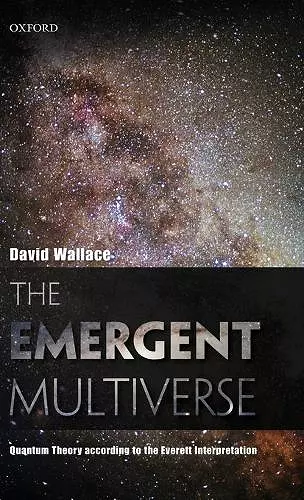The Emergent Multiverse
Quantum Theory according to the Everett Interpretation
Format:Hardback
Publisher:Oxford University Press
Published:24th May '12
Currently unavailable, and unfortunately no date known when it will be back
This hardback is available in another edition too:
- Paperback£41.49(9780198707547)

Joint winner of the Lakatos Award for an outstanding contribution to the philosophy of science.
David Wallace argues that we should take quantum theory seriously as an account of what the world is like--which means accepting the idea that the universe is constantly branching into new universes. He presents an accessible but rigorous account of the 'Everett interpretation', the best way to make coherent sense of quantum physics.The Emergent Multiverse presents a striking new account of the 'many worlds' approach to quantum theory. The point of science, it is generally accepted, is to tell us how the world works and what it is like. But quantum theory seems to fail to do this: taken literally as a theory of the world, it seems to make crazy claims: particles are in two places at once; cats are alive and dead at the same time. So physicists and philosophers have often been led either to give up on the idea that quantum theory describes reality, or to modify or augment the theory. The Everett interpretation of quantum mechanics takes the apparent craziness seriously, and asks, 'what would it be like if particles really were in two places at once, if cats really were alive and dead at the same time'? The answer, it turns out, is that if the world were like that--if it were as quantum theory claims--it would be a world that, at the macroscopic level, was constantly branching into copies--hence the more sensationalist name for the Everett interpretation, the 'many worlds theory'. But really, the interpretation is not sensationalist at all: it simply takes quantum theory seriously, literally, as a description of the world. Once dismissed as absurd, it is now accepted by many physicists as the best way to make coherent sense of quantum theory. David Wallace offers a clear and up-to-date survey of work on the Everett interpretation in physics and in philosophy of science, and at the same time provides a self-contained and thoroughly modern account of it--an account which is accessible to readers who have previously studied quantum theory at undergraduate level, and which will shape the future direction of research by leading experts in the field.
The Emergent Multiverse is the most extensive, careful, and wide-ranging discussion of Hugh Everetts so-called Many Worlds interpretation of quantum theory in existence (at least on our branch of the multiverse), and is certain to become the locus classicus for all future discussions of the theory. Since the first obligation of a reviewer is to give guidance to potential readers, I will discharge that obligation first: if you have any interest in studying or trying to understand the Everett theory, you must get this book. You wont find a better discussion of both foundational issues and far-flung consequences of the theory anywhere. David Wallace has been brooding on the theory, and fielding objections to it, for over a decade. His considered views and responses are as careful and sophisticated as any on the market, and are equally attuned to physical and to philosophical issues. * Tim Maudlin, Nous *
This book is an outstanding achievement. It presents the current state of the art in the Everett interpretation to a depth and level of sophistication that will be appreciated by the leading experts in the foundations of quantum theory (of whom Wallace is one) -- and will educate them, and should chasten most of them. Yet, at the same time, the presentation is so clear and down-to-earth that this could serve as an introductory textbook for (say) undergraduates who are unfamiliar with any of the issues or even with quantum theory. This combination of relentlessly watertight argument with relentless common sense, however counter-intuitive the subject matter, is something Wallace is very good at. So much so that I think that even a philosophically-minded lay person, who would have to skip most of the technical discussion and equations, might nevertheless devour this book and learn a great deal from it * David Deutsch, Centre for Quantum Computation, The Clarendon Laboratory, University of Oxford *
Nobody has done more to defend, clarify and advance the Everett interpretation over the past dozen years than Wallace, and this book is the culmination of his work on this area. As those who have read Wallace's articles will expect, it is an excellent book, and should be required reading for anyone interested in the foundations of quantum mechanics * Peter J. Lewis, Notre Dame Philosophical Reviews *
The dialogic interludes are insightful and entertaining. The quotations at the beginning of each sectionare incredibly to the point...I recommend to everyone, especially to sceptics of the MWI to read this book: enjoy the brilliant and engaging style... * Lev Vaidman, The British Journal for the Philosophy of Science *
- Winner of Joint winner of the Lakatos Award for an outstanding contribution to the philosophy of science..
ISBN: 9780199546961
Dimensions: 221mm x 149mm x 36mm
Weight: 822g
548 pages